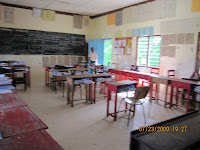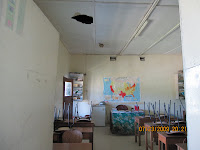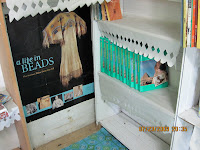As a result of being amongst 25% of applicants winning the Geraldine Dodge Teacher Fellowship of 2009, I went on this unbelievably AMAZING trip that was a major highlight of my life! In order to win, we had to research and describe in detail the 1 place in the world we most wanted to go for both personal renewal and professional development. I chose paradise and there is truly no better description for most of what I experienced...
Translate
Elementary School Visit in Namatakula Village
My host Judith, a retired teacher, & I walked to this school near their home & across the road from the residential & church areas. The headmaster, seen here with the kids, escorted me on a tour of the school. All students wear uniforms representing their school in Fiji. Although it wasn't in practice with all, according to a sign I read there on grooming expectations, I found it interesting that they tell little girls they should wear their hair cut short. As we entered the school, we passed some children who were leaving since it was the end of the day; others played in the field while still other children were putting things away & cleaning up their classrooms.
Though handmade posters in each class seemed to be the primary teaching material, some information these kids were learning, I could've sworn I've seen posted by some of my own "high school's" classrooms. It reminded me of my Trinidadian sister-in-law saying how much more advanced the British education system and influence still is over the American; she claimed they learned more content & at much earlier ages than children here in the U.S. do. Yet, most Fijians don't finish school beyond the mandated primary years. Like in many other developing nations, high school must be paid for by their parents who are usually unable to afford it, or a sponsor.
That may be so but the few books seen were old dusty ones in the library donated by a group of seniors from the U.S. who annually vacation at Namatakula Village. In fact, though some of the bookcases were empty, this vacationing group had donated the library itself. I still want to get more discarded library & textbooks donated to this school's library & a few other schools in Fiji which our school district would otherwise sell to a recycling company. The challenge is to find a Fijian rotary club for this area, along with a means of transporting them from our school district to the ships or planes that would make the deliveries, then getting them to the designated schools, along with covering the costs. Any suggestions would be appreciated.
The last room I entered in the school was the only office, a tiny room containing a photo of the school's founder. I don't recall seeing any working technology in the office & none elsewhere in the school. There was no Internet access there at all, as in the village in general (although my hosts did have a telephone in the front of their home).
Like other villagers, teachers of both genders all wear a wrap called a sulu tied around their waist and covering most of their legs. This is also expected of village guests in most Fijian villages, although Judith told me it was fine to dress as I normally would in her more westernized village. I sat on the steps of the school with the 2 teachers present, watching the children play rugby, the most popular sport, amidst the many mud puddles on the field. Many of them, like many Fijians in general outside of the towns, were barefoot.
If there are not enough teachers from the village, as is the case here, they are recruited from elsewhere in the country and temporary housing is provided for them on the school grounds for the school year. I was allowed to enter 1 such teacher's home on the premises. Given the couple of objects in the front room from 2 other cultures in Fiji, I figured the home belonged to a world history teacher like me. I also noticed I'm not the only teacher in need of a housekeeper.
Subscribe to:
Post Comments (Atom)

























No comments:
Post a Comment